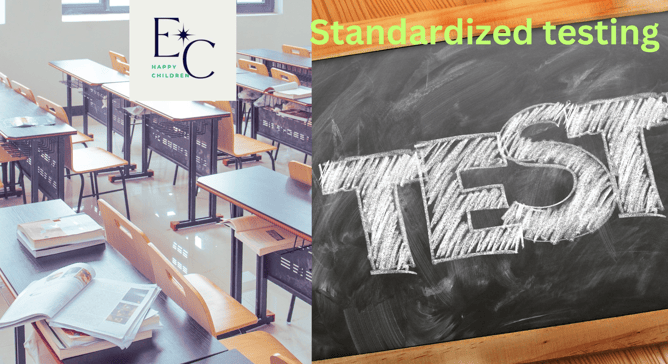The Impact of Standardized Testing on Student Learning
The Effects of Standardized Testing on Student Learning: Explore the impact of standardized testing on student achievement, mental health, and educational outcomes
12/31/20246 min read


The Impact of Standardized Testing on Student Learning: Benefits, Drawbacks, and Considerations
Standardized testing has been an integral part of educational systems worldwide, designed to measure students' academic abilities and overall school effectiveness. However, the influence of standardized testing on student learning has been widely debated. While some argue that these exams offer an unbiased, uniform way of assessing students, others contend that they may hinder students' educational experiences. This article delves into the positive and negative effects of standardized testing on learning, along with potential solutions for a more balanced approach to student assessment.
What is Standardized Testing?
Standardized tests are assessments that are administered and scored consistently for all students, ensuring fairness and comparability. Examples include exams like the SAT, ACT, and various state assessments that test subjects such as mathematics and reading. These exams aim to objectively assess a student's academic performance and provide data that can be compared across different schools or regions.
The Purpose of Standardized Testing
The main goal of standardized testing is to evaluate the knowledge and skills students have gained throughout their education. These tests are used to measure academic progress and help determine the effectiveness of educational institutions. Supporters believe these tests are valuable for ensuring fairness and providing consistent measures for evaluating student achievement, but there is growing concern about whether they truly capture a student's full range of abilities.
Benefits of Standardized Testing for Student Learning
One significant advantage of standardized testing is that it promotes accountability in education. By setting clear benchmarks, schools and educators are held responsible for their students' academic performance. This allows for tracking student outcomes and helps identify areas where improvements are necessary. Moreover, standardized tests provide an objective tool for comparing student achievement across regions, which is important for monitoring national and state-level education standards.
Ensures Accountability and Uniformity
Standardized tests ensure that all students, regardless of location or socioeconomic background, are assessed using the same criteria. This creates a system that is fair and equitable for all students. For educational policymakers, these tests provide essential data to assess whether resources are being allocated properly and whether certain regions or schools need additional support to help students succeed.
Identifies Gaps in Student Learning
Standardized testing can also reveal where students are struggling academically. By analyzing test results, educators can identify trends and areas in which students need more attention. For example, if a significant number of students perform poorly in mathematics, schools can intervene by offering targeted support or revising the curriculum to address specific challenges. This ability to identify weaknesses is vital for improving education quality.
Fosters Focus and Discipline Among Students
Preparing for standardized tests can instill valuable habits in students, such as time management and organization. The structured nature of these exams encourages students to focus on their studies and work diligently to prepare. These skills can benefit students beyond the exam room, helping them develop a sense of responsibility and discipline that will serve them throughout their academic careers.
Test Anxiety and Stress
One of the most notable drawbacks of standardized testing is the anxiety it causes students. The pressure to perform well on these high-stakes exams can be overwhelming, particularly for students who may already struggle academically. This test-related stress can diminish their confidence and negatively impact their test results, making standardized tests an imperfect measure of a student's true academic abilities.
Limiting the Curriculum
As educators focus on preparing students for standardized exams, they often narrow the curriculum to concentrate on subjects that are directly tested. This emphasis on exam-specific content may lead to a loss of more diverse, enriching educational experiences, such as arts, social sciences, and critical thinking exercises. Standardized tests may inadvertently reduce the breadth of learning, pushing students to prioritize test-taking strategies over well-rounded intellectual development.
Bias Toward Certain Groups
Another significant criticism of standardized testing is that these exams can be biased against certain student groups, particularly those from low-income backgrounds or non-native English speakers. Socioeconomic status and cultural differences can affect test performance, leading to disparities in achievement. This raises concerns about the fairness of standardized tests and whether they truly offer an equal opportunity for all students to succeed.
The Ongoing Debate: Do Standardized Tests Reflect True Student Learning?
There is an ongoing debate about whether standardized tests are an accurate reflection of a student’s capabilities. Supporters argue that these exams offer an impartial and reliable measure of student performance, while critics believe that the tests fail to capture important aspects of learning, such as creativity and problem-solving. As a result, many question whether standardized tests should remain the primary method of student assessment.
Support for Standardized Testing
Proponents of standardized testing assert that these exams provide an objective and reliable way to measure academic achievement. Since all students are tested under the same conditions, standardized tests offer a fair comparison of performance across a wide range of students. Additionally, these exams provide data that can be used to inform education policy, helping to identify areas that require attention at both the local and national levels.
Criticism of Standardized Testing
Critics argue that standardized tests do not fully reflect a student's intellectual potential. They contend that these exams primarily measure basic skills like memorization rather than evaluating a student's ability to think critically or solve complex problems. Additionally, the pressure to perform well on standardized tests may harm students' enthusiasm for learning, as it turns education into a test-taking exercise rather than a pursuit of knowledge and growth.
Long-Term Impact of Standardized Testing on Academic Performance
Studies examining the long-term effects of standardized testing on student achievement yield mixed results. While high scores on standardized tests may correlate with success in higher education, they do not necessarily predict career or life success. Furthermore, the emphasis on test scores can sometimes lead to negative attitudes toward school, as students may begin to view education solely as a series of tests to be conquered rather than a meaningful, lifelong learning journey.
Do Standardized Tests Predict Future Success?
While standardized test scores can provide some indication of academic aptitude, they are not reliable indicators of long-term success. A student's future success is influenced by many factors that standardized tests cannot measure, such as motivation, resilience, creativity, and interpersonal skills. These qualities play an important role in academic and professional achievement, and their absence from standardized tests calls into question the validity of these exams as predictors of future success.
Improving Standardized Testing for Better Student Outcomes
To make standardized testing more accurate and fair, many educators and policymakers are advocating for reform. Suggestions include modifying test formats to assess higher-order thinking skills and making accommodations for students with disabilities. Additionally, blending standardized testing with other types of assessments, such as projects or portfolios, could provide a more comprehensive view of a student's academic performance and overall potential.
Combining Testing with Alternative Assessments
To gain a more complete picture of student learning, it is crucial to combine standardized tests with alternative forms of assessment. These might include project-based assessments, oral presentations, and portfolios that showcase students' critical thinking and creativity. By using multiple assessment methods, educators can better understand students' strengths and weaknesses and provide more tailored support to help them thrive.
In summary, the effects of standardized testing on student learning are complex and varied. While these tests offer several advantages in terms of accountability and tracking academic progress, they also have significant drawbacks, including heightened stress, a narrow focus on specific subjects, and potential bias. Moving forward, it is essential to consider ways to improve standardized testing while also embracing alternative forms of assessment to ensure that all students are evaluated fairly and holistically.
The Influence of Standardized Testing on Education Policy and Reforms
Standardized testing plays a pivotal role in shaping educational policies and reforms. By offering a reliable and objective way to assess student performance, these tests provide valuable insights for policymakers to evaluate the effectiveness of educational programs. Standardized test scores can uncover gaps between schools, districts, or regions, prompting the need for targeted interventions. For instance, if certain student groups consistently perform poorly on these exams, policymakers can direct additional resources or modify teaching strategies in those areas. This data-driven approach helps improve education and ensures a more equitable distribution of resources across the system.
However, the overreliance on standardized tests for policy decisions comes with some challenges. While these tests offer important data on student achievement, they may not capture the full scope of a student’s educational experience. Critics argue that an excessive focus on test scores often leads to "teaching to the test," prioritizing exam preparation over fostering critical thinking, creativity, and other vital skills. This restricted focus can limit students’ opportunities to explore diverse and meaningful learning experiences, narrowing their educational development.
Standardized Testing and Issues of Educational Equity
A major point of contention surrounding standardized testing is its impact on educational equity. Though these tests are meant to be impartial, they often overlook key factors such as socioeconomic background, cultural differences, and access to educational resources. Students from lower-income families, for example, may not have access to the same test prep resources as wealthier students, leading to significant gaps in test scores. Furthermore, students with disabilities or non-native English speakers may face additional barriers, affecting their test performance and distorting the results.
To address these issues, many have advocated for reforms aimed at making standardized testing more inclusive and equitable. Proposed changes include offering accommodations for students with special needs, providing test preparation resources for underserved communities, and incorporating alternative assessment methods that better capture students' diverse abilities. These changes would ensure that all students, regardless of their background or challenges, have an equal opportunity to perform well and succeed academically.
Looking Ahead: The Future of Standardized Testing
It is evident that standardized testing will continue to be a key aspect of education, but it will likely evolve in the future. We may see a shift toward a more balanced assessment approach, combining traditional exams with other methods such as project-based assessments, portfolios, and peer evaluations. By diversifying the ways student performance is measured, educators can gain a more holistic understanding of each student’s strengths and areas for improvement, ultimately leading to better outcomes and a more well-rounded education system.
Foster positive learning environment for young minds with perfect advices
© 2024. All rights reserved.
